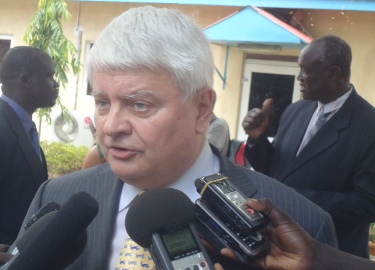South Sudan says UN explanation for attack helicopters not satisfactory
June 19, 2015 (JUBA) – South Sudanese government on Friday said it did not get a proper and satisfying explanation giving reason for which the United Nations (UN) sought the approval to bring attack helicopters into the country.

“As the government, we did not reject the request of the United Nations but we asked for explanations. The reasons which were given were not satisfactory,” said deputy foreign affairs minister, Peter Bashir Gbandi.
The reasons which the United Nations gave the government to warrant approval of the attack helicopters and unmanned aerial vehicles was allegedly grounded on the necessity to provide protection to civilians coming under direct and targeted attacks from belligerent warring parties in the country.
“South Sudan is a sovereign state with full sovereign responsibilities. It is a country with capable army to provide adequate protection to her citizens and their properties within its territorial jurisdiction. Any support, whether technical or in any form must be supplementary,” Gbandi told Sudan Tribune.
The official was reacting to a report by the UN slamming president Salva Kiir on Wednesday for hindering efforts to protect civilians by blocking UN attack helicopters and surveillance drones and declaring that UN personnel caught taking photos will be deemed spies.
Ladsous told the United Nations Security Council that the world body wanted to do a better job protecting civilians amid the country’s civil war.
Some 136,000 civilians are presently sheltering at seven UN sites around the country.
“We needed attack helicopters, request denied; we needed UAVs (unmanned aerial vehicles), request denied by the president to me, personally, three times last year,” Ladsous told a UN Security Council meeting on peacekeeping operations.
“Juba did declare some of our senior personnel persona non grata, if you look at the fact that yesterday it was announced that UN personnel taking pictures will be considered a spy, I think this raises a number of concerns,” he said. .
Ladsous said the movements of peacekeepers had also been restricted during the 18-month conflict in the world’s newest state, which seceded from Sudan in 2011. There are some 12,000 UN troops and police in South Sudan.
But the deputy foreign minister denied the mission in the country was facing any difficulty in movement.
“That is very unfortunate report. It does not reflect facts. Everyone in this country knows, even small children that UNMISS moves throughout. They are out 24 hours and no one has ever stopped them from carrying out their activities except in areas which are not under the control of the government,” Gbandi said.
He also said the UN should instead blame the rebels led by former vice president, Riek Machar, for allegedly restricting non-governmental personnel in their controlled areas.
(ST)
